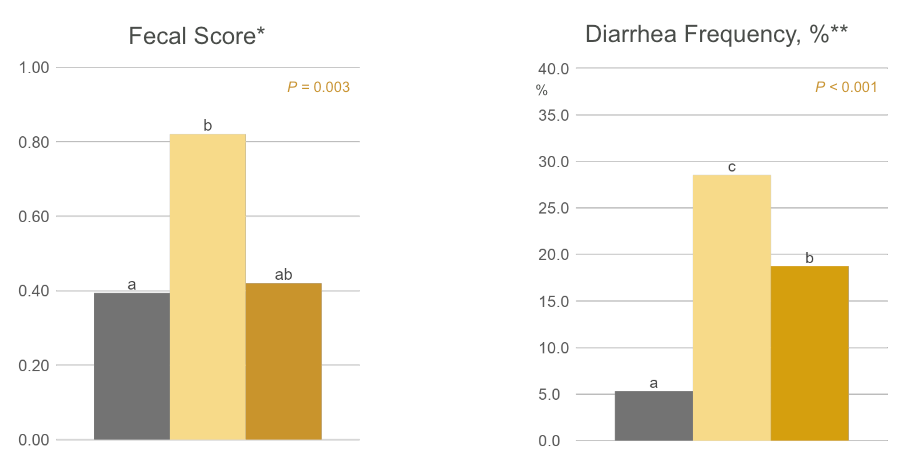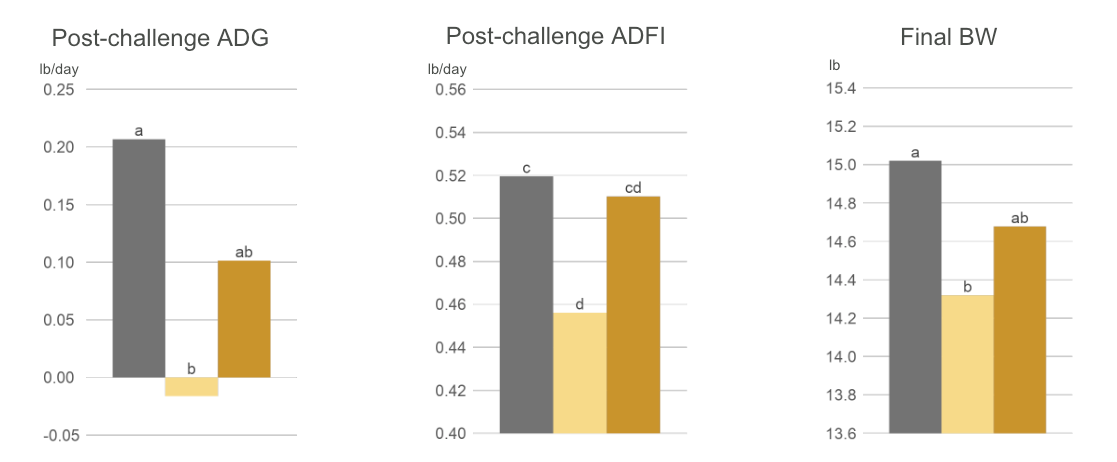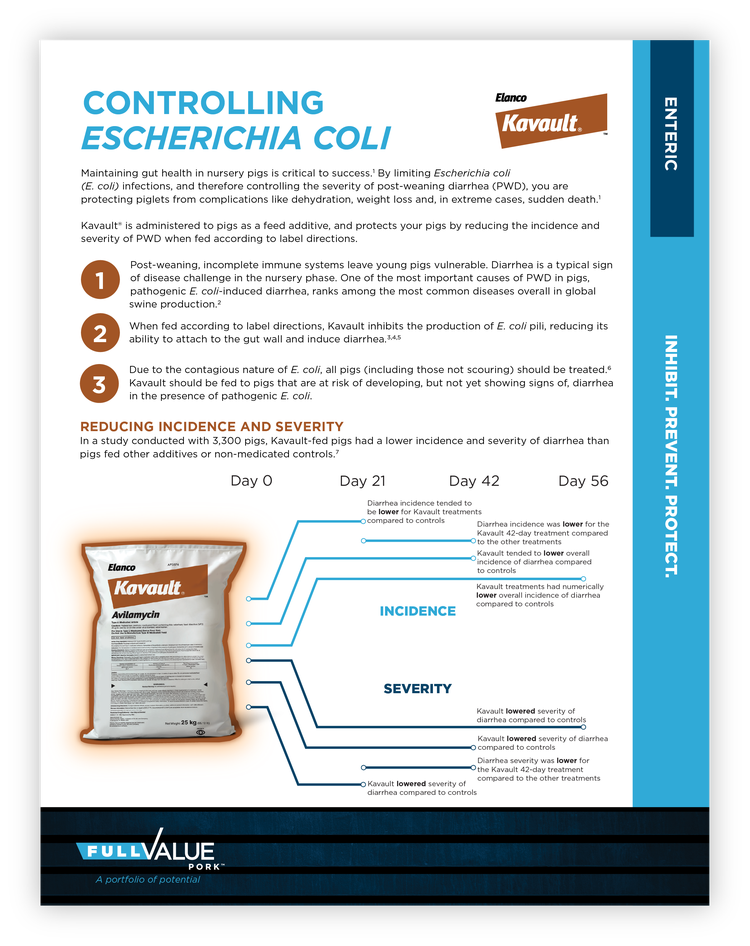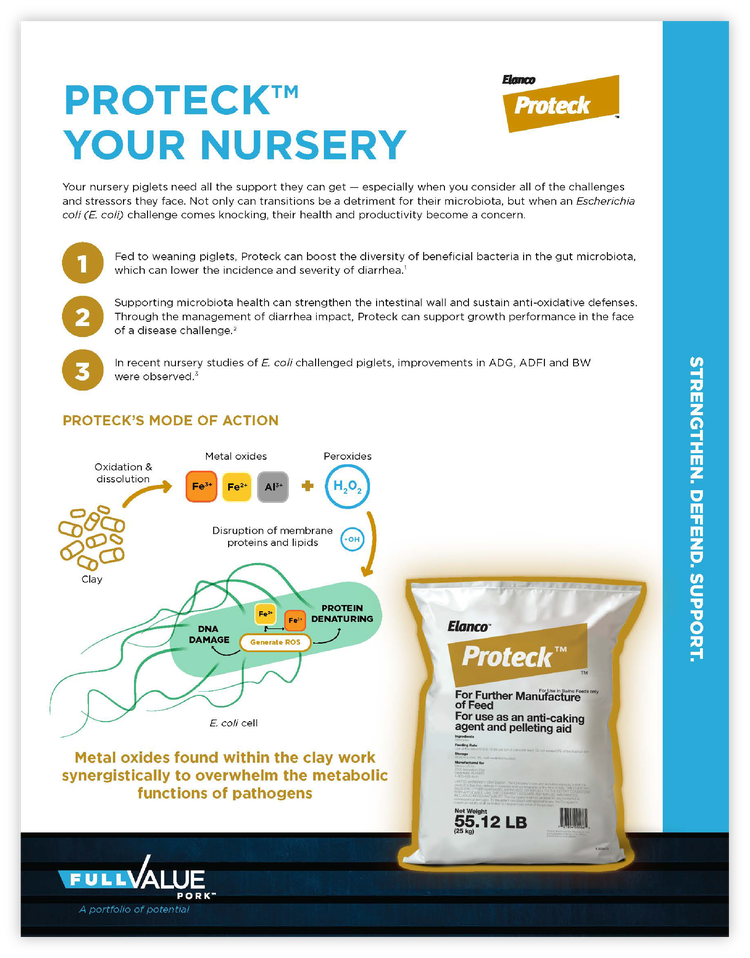The severity of post-weaning diarrhea (PWD) can be exacerbated by the stress of weaning, dietary changes, lack of milk antibodies, and commingling with other pigs or other environmental changes. Infections in nursery pigs may result in diarrhea during the first 1-2 weeks post-weaning and up to 22 days, typically resulting in dehydration and reduced weight gain. Increased nursery mortality, high morbidity, and lower average daily gain (ADG) and feed effciency have been reported following an F18 outbreak.1
Additional infections can also occur alongside this, because of enterotoxigenic E. coli (ETEC) lowering immune response — even toward vaccines administered in the nursery phase. These ETEC bacteria fasten to receptors in the lining of the small intestine, impairing the lining and increasing fluidity in gut content and reducing the body’s ability to absorb water for vital functions.
Fecal shedding results in pathogens that can survive in contaminated buildings and create persistent infections in successive litters, unless rigorous sanitation and husbandry practices are applied. E. coli-induced challenges will persist until intervention.
GET AHEAD OF POTENTIAL LOSS
E. coli is an old bacterial nemesis finding its way back into swine herds, but producers and veterinarians have several tools to combat it and lessen its impact. Gut health of newly-weaned piglets is directly connected with their lifetime growth performance and economic value.1 Elanco’s portfolio has the means to aid you in arming your pigs’ immune and digestive systems with the tools to ensure their intestinal processes can work as intended, absorbing maximum nutrients and water for growth and daily gain.
CALM THE E. COLI CHAOS
A recent study compared the efficacy of Kavault in a commercial population of pigs commonly experiencing diarrhea associated with pathogenic E. coli. In the 3,300 pig study, Kavault-fed pigs had a lower incidence and severity of diarrhea than pigs fed other additives or non-medicated controls.6
DECREASED DIARRHEA INCIDENCE
DECREASED DIARRHEA SEVERITY
LIMITING PWD HAD THESE IMPROVEMENTS ON OVERALL PIG PERFORMANCE.6
Numerically INCREASED BODY WEIGHT compared to controls
Numerically INCREASED AVERAGE DAILY GAIN
IMPROVED FEED CONVERSION RATE
PROTECK YOUR NURSERY
The microbiota is influential in a strong intestinal wall that can help protect the piglet from disease challenges. When fed to wean piglets, Proteck can boost the diversity of beneficial bacteria in the gut, which can lower the incidence and severity of diarrhea.5


Contact your Elanco representative to discover the right solutions for your operation.


The labels contain complete use information, including cautions and warnings. Always read, understand and follow the label and use directions.
BAYTRIL® IMPORTANT SAFETY INFORMATION:
CAUTION: Federal (U.S.A.) law restricts this drug to use by or on the order of a licensed veterinarian. Federal (U.S.A.) law prohibits the extra-label use of this drug in food-producing animals. To assure responsible antimicrobial drug use, enrofloxacin should only be used as a second-line drug for colibacillosis in swine following consideration of other therapeutic options.
- Not for use in humans. Keep out of reach of children.
- Avoid contact with eyes. In case of contact, immediately flush eyes with copious amounts of water for 15 minutes.
- In case of dermal contact, wash skin with soap and water. Consult a physician if irritation persists following ocular or dermal exposures.
- Individuals with a history of hypersensitivity to quinolones should avoid this product. In humans, there is a risk of user photosensitization within a few hours after excessive exposure to quinolones. If excessive accidental exposure occurs, avoid direct sunlight.





